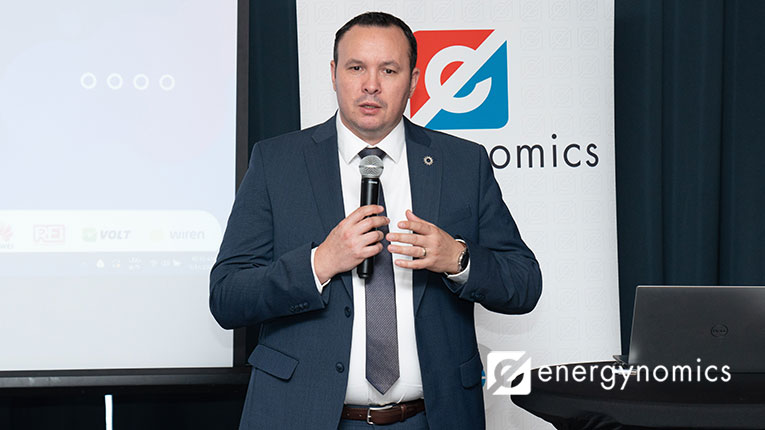Renewable energy is not the key to the planet’s energy independence in the absence of an energy mix and battery systems. In this sense, the Romanian legislation in the field of regulation of energy storage facilities is incomplete. At the same time, without changing the behavior of the beneficiaries, so that consumption overlaps with energy production, we cannot talk about efficiency.
“Many imagined that if they installed photovoltaic panels, they would no longer pay bills. It’s no secret that renewable energy is not a 100% feasible solution to meet humanity’s energy needs. The solution for the future is the energy mix and, little by little, efficiency will also come from digitalization, self-consumption and as a result of changing consumer behavior”, said Adrian Paraschiv, Photomate Country Manager, during the conference “Digitalization and Energy Efficiency – Cluj-Napoca”, organized by Energynomics.
This problem of ensuring energy quantities is a global one, and currently, photovoltaic systems represent the fastest investment to generate energy. However, they are not enough to produce energy at a constant rate. The solution to this problem lies in the development of hydrogen storage and use. However, in both fields, Romanian legislation is either non-existent or incomplete.
“Unfortunately, Romania has lagged behind with the legislation on large capacity storage units. They are neither prohibited, nor clear prerequisites for them to be connected to the national energy system are specified. The same is true of hydrogen. We have the ability to provide the technology to produce green hydrogen, but we don’t have the legislation. I can’t understand why we don’t simply copy/paste what Germany or Australia did. We are going to see if Romania will at least manage to draw inspiration from these examples of good practice”, added Paraschiv.
At the same time, the installation of photovoltaic panels is not a guarantee for the beneficiary’s energy independence from the grid, due to the discrepancy between the production and consumption profiles. In the residential sector, high energy consumption occurs in the morning between 7.00 and 9.00 and in the evening, between 19.00 and 23.00, while the photovoltaic panels produce mainly between 10.00 and 16.00. Thus, the purpose for which the beneficiary installed the respective solar panels is not achieved.
According to Paraschiv, without a storage system or a compensation mechanism for the injection of energy produced in the distribution network, we cannot talk about energy efficiency. This goal could be achieved if consumption behavior is changed so that consumption overlaps with energy production, or if investment in a storage system is taken into account, but which will put additional pressure on the grid. However, an investment in the production of energy from photovoltaic sources is not justified when the consumption is below a certain threshold, and this also applies to electricity storage systems. “If we have a consumption of 200 kWh per month, it does not make sense to install our own photovoltaic system, because the investment recovery rate is very high. The same for batteries,” Paraschiv said.
In the medium term, another problem is looming, related to the maintenance of residential PV systems. Considering that the legislation does not provide for a mechanism to guarantee the operation of the respective facilities, it is expected that in the medium term there will be difficulties in ensuring the operation. Currently, thanks to this wave of investments in photovoltaic panels, many companies have turned to installation services for these installations, taking advantage of the favorable economic context. In a few years, when the frenzy will moderate, many companies will turn again to other sectors of activity. “Who will the beneficiaries then turn to for repair services, maintenance, and guarantees? A quality assurance system would be necessary to give the beneficiary the guarantee that his photovoltaic system will work regardless of what happens to the company that installed it. The cost of such insurance is zero point something percent of the total cost of the installation. It’s very-very small. But, without legislation in this sense, very few companies think about it”, stated Paraschiv.
This impediment is also present in the case of the government’s Casa Verde program, which does not contain specifications on monitoring the quality of installations.
The “Digitalization and Energy Efficiency – Cluj-Napoca” conference was organized by Energynomics with the support of its partners: Eaton Electric, Elgeka-Ferfelis Romania, Enel X, EnergoBit, Kawasaki Gas Turbine Europe, MET Energy Romania, REI Group, Photomate, Volt, Wiren.
